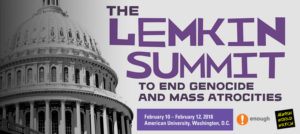More than 150 students and adults eager to learn about ongoing mass atrocities and what they can do about them will gather from Feb. 10-12 in Washington, D.C., for the third annual Lemkin Summit to End Genocide and Mass Atrocities.
The Summit, held at American University, is named after Polish lawyer and activist Raphael Lemkin who coined the term “genocide,” which comes from the Greek genos (race or tribe) and the Latin cide (killing). The three-day conference features experts in the field, panel discussions and advocacy training, culminating in a day of meetings on Capitol Hill to advocate for anti-genocide action.
The event is a joint initiative of Jewish World Watch and The Enough Project, which supports peace and an end to mass atrocities in Africa’s deadliest conflict zones. JWW works to end genocide and mass atrocities worldwide by educating and mobilizing individuals, advocating for policy changes, and funding projects to support and build resilience in conflict-affected communities.
Among those who will be speaking at the conference:
- Nancy Steinson Ehrlich, a friend of the late Raphael Lemkin
- Nicole Widdersheim, director of African Affairs at the National Security Council
- Ambassador Liberata Mulamula, Tanzania’s Permanent Secretary at the Ministry of Foreign Affairs and International Co-Operation
- John Prendergast, founding director of The Enough Project
- Susan Freudenheim, executive director of Jewish World Watch, as well as other JWW staff members
Attendees will learn about what the U.S. government can do to prevent and respond to genocide and mass atrocities, as well as financial tools that can be used to counter conflict and corruption. There will be updates on current flashpoints, including Myanmar (Burma), South Sudan, and the Democratic Republic of the Congo.
Specific topics include “Activism: From the Darfur Movement to Today,” “Civil Society’s Role in Creating Change,” “Responding to Genocide and Mass Atrocities,” and “Genocide and the Media.” JWW and The Enough Project’s staff also will give an introductory overview of lobbying basics, including policy asks that attendees will make during actual visits to politicians on Capitol Hill.
The question at the forefront of much of the weekend will be the same, sadly, as Lemkin asked himself years ago: “Why is the killing of a million a lesser crime than the killing of an individual?”
Stay tuned for more coverage.


